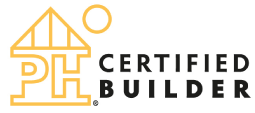Building a custom home is a bit like buying a new car, right? Not exactly. If you asked a car dealer how much he charges per pound, you’d get some very strange looks. Of course, there is some correlation between the cost of the car and its weight, but not significant enough to prompt that question. We all know car dealers don’t sell by the pound.
In the same way, I feel perplexed when someone asks me how much I charge per square foot to build a home. It’s not the right question. It’s a better idea to ask a builder what price range they typically build in and then have them describe the homes they build. This will give you a good idea if the builder has experience in your type of home. There are several factors that contribute to the cost of a home: complexity, level of finish, size, components, and the site.
- Complexity:
A home with more features and greater complexity requires more labor, and therefore costs more to build. For example, a rectangular house with four basic corners is less expensive to build than a three-story home with 40 corners, angled walls, and steep roofs, because the latter is more complex and takes more time to complete.
- Level of Finish:
Obviously, vinyl flooring is much less expensive than wood or stone. Formica countertops are less expensive than granite. Stucco siding is less expensive than wood or steel. Thermador, Wolf, or Subzero appliances cost more than basic GE appliances. Twelve-inch baseboards cost more than six-inch baseboards, a lot of molding is more expensive than no molding at all. The level of finish you choose for your home will have a significant impact on the home’s final cost. - Size and Components:
Size matters in homebuilding costs. A 6,000-square-foot home will cost more than a 2,000-square-foot home. A 2,000-square-foot home would probably include a two-car garage, while a 6,000-square-foot home normally has three or four garage bays. So not only does the larger home cost more due to the size of the heated and air-conditioned space, but it also takes into account things like garages, number and size of porches, whether the home has a wrap-around covered porch, oversized sliding glass doors, circular drive, and other costly components. Another example is a basement; a 2,000-square-foot home with a full basement costs more than the same home without a basement. But the square foot price is misleadingly lower since the basement nearly doubles the heated area without doubling the cost. Which brings up another point: heated or unheated space. Many builders use the heated square foot method to calculate their per square foot number costs, while others use the total area under a roof. Both of these methods are valid and each produces a different per square foot price. - Sitework:
The conditions of the land that you own can significantly impact the cost to build your home. Steep or rocky land will require more excavation time than flat land. Sometimes, rural land needs to have utilities brought to it from some distance away instead of a city lot which typically has utilities in place. Maybe the house sits far back from the road and requires more utility trenching and a longer driveway. Maybe a septic tank or water well is needed. Some lots need soil hauled in and some need soil hauled away; both add more excavation and trucking costs to the home. And sometimes even a flat subdivision lot has poor soil and requires additional work to remediate it prior to building.
All in, the price per square foot is a flawed method to determine the cost of your home. It’s a better idea to ask a builder what price range they typically build in and then have them describe the homes they build. Be honest with your builder about your budget and work together to design and build the house that fits your budget.














